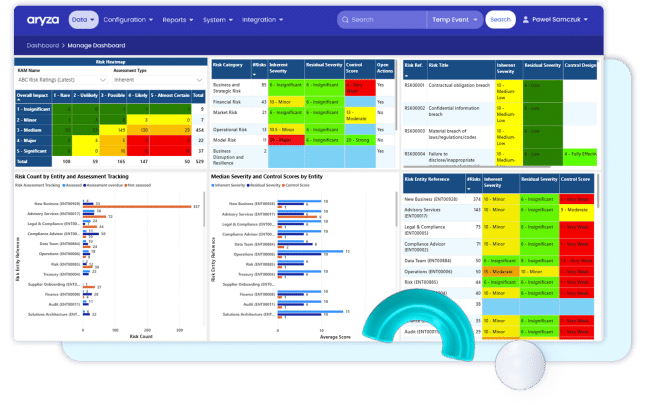Operational Risk: Turn Operational Risk into Business Value
Operational risk isn’t just about avoiding loss—it’s about gaining insight. By centralising data, automating analysis, and linking risk to strategy, organisations can uncover opportunities to improve performance, resilience, and compliance.

Understand operational risk
Enriched with operational risk industry expertise over 15 years, Aryza Unite – Operational Risk is a solution developed through partnership with best practices in mind. Used by more than 85 financial organisations around the globe, it has been voted best-in-class for operational risk software by independent industry analysts.
Centralise Risk Data
Maintain a single source of information – Adopt governance best practices by creating one library for all risks, controls, and key indicators. Maintain a golden source for all GRC data.
Visualise Operational Risk
Communicate about operational risk – Engage with fully integrated BI reporting to create interactive dashboards and reports that will help key stakeholders understand operational risk across the business. Or use dozens of report templates out-of-the-box.
Put Risk Appetite into Practice
Operationalise the risk appetite – Connect the risk appetite to RCSAs, KRIs, and other forms of operational risk data to fully translate policy into reality across the business.
Track Key Indicators Proactively
Monitor KRIs and KCIs – Track key indicators proactively with automated data via API. Set up alerts and workflows should indicator thresholds be breached.
Optimise RCSAs
Harvest more value out of RCSAs – Link RCSAs with risk and control data to better understand what is working – and not working – within the organisation. Conduct cost-benefit analysis of risks and controls.
Enable Scenario and Capital Analysis
Prepare for scenario analysis and capital calculations – Have all of the necessary data ready and waiting for use in Aryza Unite – Risk Analytics and Capital Analytics modules.
Log and Analyse Loss Events
Capture loss events – Enable the business to submit loss event data via online forms, which trigger incident alerts and workflows. Connect events to risks and controls through causal analysis.
Enhance business performance
Operational risk data can be an incredibly rich source of insight for financial services firms who understand what information to gather and how to probe it. So, having the right technology in place to support GRC intelligence is essential. Aryza Unite – Operational Risk enables firms to collect, analyse and share this information – helping the business understand how it can be more efficient and effective, to deliver more value.

Case: Leading UK Based Investment Manager
Case: Leading Global Financial Services Firm
Case: Major Global Banking Institution
A leading UK based Investment Manager with over £22Bn in funds under management implemented Aryza Unite and migrated from another GRC supplier. The migration was carried out seamlessly with minimal to zero disruption.
The firm is using the Aryza Unite widely within the organisation and utilise the functionality for a large number of GRC activities.
These include:
- Reporting and escalation of dealing errors using the Incident Management functionality
- Compliance Monitoring
- Compliance Thematic Reviews
- Compliance Breaches
- Internal Audit Reporting
- Regulatory Horizon Scanning
- Policy Exception
- Product and Service Reviews
- Third Party SLA Breaches
- Data Breach Analysis and Escalation
- Risk and Control Testing
This deployment demonstrates the wide potential of Aryza Unite to provide significant value across a wide spectrum of GRC activities and showcases the deep functionality and flexibility inherent in the system.
Despite the challenges of a rapidly changing regulatory environment, a leading global financial services firm has successfully implemented Aryza Unite, migrating from their legacy GRC system.
The firm identified a clear opportunity to enhance their GRC processes to meet more stringent regulatory requirements while improving operational efficiency. The Aryza system and team were chosen as they wanted to implement a market-leading and dynamic platform supporting a diverse range of GRC activities including incident management, risk and control assessments, key risk indicators, compliance and policy management.
The system needed to deliver more efficient risk management with effective and consistent risk assessment and reporting capabilities to support the firm’s operations across multiple jurisdictions. Utilizing its experienced team of GRC experts, coupled with its unique mix of modern, adaptable software, Aryza delivered a phased approach to implementing an enterprise-wide solution that automated processes, eliminated silos, and improved ease of use and efficiency.
The platform has led to significant improvements in incident management, risk assessment quality, and reporting capabilities, enabling the firm to respond more effectively to regulatory requirements
A major global banking institution with operations in over 30 countries implemented Aryza Unite to standardize their risk management approach across all regions. The company needed a solution that could accommodate varying regulatory requirements while providing consolidated group-level reporting.
The initial scope of the project was to implement the Risk and Control Assessment (RACA) module to create consistency in how operational risks were assessed across the organization. We delivered a configurable RACA process that allowed for local customization while maintaining group-wide standards. The system’s flexibility enabled the company to apply different risk assessment matrices for different business units while rolling up to consistent group reporting.
Following the successful implementation of the RACA module, the company expanded the implementation to include incident management, key risk indicators, and action tracking. The integrated nature of our solution allowed for automatic linkage between incidents, risks, and controls, providing a comprehensive view of the risk landscape.
The incident management functionality was particularly impactful as the wide and diverse nature of the group meant that reporting of incidents was unstructured and difficult to quantify and track.
The implemented system was transformational and enabled a centralised view of incidents, with rapid response times and features such as root cause analysis and automated action plans
Contact us
"*" indicates required fields







